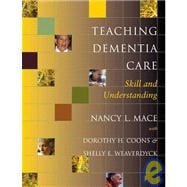
Nancy L. Mace, M.A., now retired, was a consultant to and a member of the board of directors of the Alzheimer's Association and an assistant in psychiatry and coordinator of the T. Rowe and Eleanor Price Teaching Service of the Department of Psychiatry and Behavioral Sciences at the Johns Hopkins University School of Medicine.
| Acknowledgments | xi | ||||
|
|||||
|
3 | (18) | |||
|
21 | (18) | |||
|
39 | (294) | |||
|
|||||
|
47 | (19) | |||
|
48 | (1) | |||
|
49 | (1) | |||
|
50 | (6) | |||
|
56 | (10) | |||
|
66 | (48) | |||
|
68 | (7) | |||
|
75 | (1) | |||
|
76 | (4) | |||
|
80 | (34) | |||
|
114 | (37) | |||
|
116 | (5) | |||
|
121 | (7) | |||
|
128 | (2) | |||
|
130 | (21) | |||
|
151 | (32) | |||
|
154 | (6) | |||
|
160 | (4) | |||
|
164 | (3) | |||
|
167 | (16) | |||
|
183 | (27) | |||
|
185 | (4) | |||
|
189 | (2) | |||
|
191 | (4) | |||
|
195 | (15) | |||
|
210 | (18) | |||
|
212 | (6) | |||
|
218 | (2) | |||
|
220 | (8) | |||
|
228 | (25) | |||
|
230 | (7) | |||
|
237 | (3) | |||
|
240 | (13) | |||
|
253 | (12) | |||
|
255 | (3) | |||
|
258 | (7) | |||
|
265 | (24) | |||
|
266 | (5) | |||
|
271 | (18) | |||
|
289 | (20) | |||
|
291 | (9) | |||
|
300 | (9) | |||
|
309 | (17) | |||
|
312 | (2) | |||
|
314 | (4) | |||
|
318 | (2) | |||
|
320 | (3) | |||
|
323 | (3) | |||
|
326 | (7) | |||
|
327 | (2) | |||
|
329 | (4) | |||
|
|||||
|
333 | (4) | |||
|
337 | (17) | |||
|
354 | (15) | |||
| References and Resources | 369 | (2) | |||
| Index | 371 |
The New copy of this book will include any supplemental materials advertised. Please check the title of the book to determine if it should include any access cards, study guides, lab manuals, CDs, etc.
The Used, Rental and eBook copies of this book are not guaranteed to include any supplemental materials. Typically, only the book itself is included. This is true even if the title states it includes any access cards, study guides, lab manuals, CDs, etc.